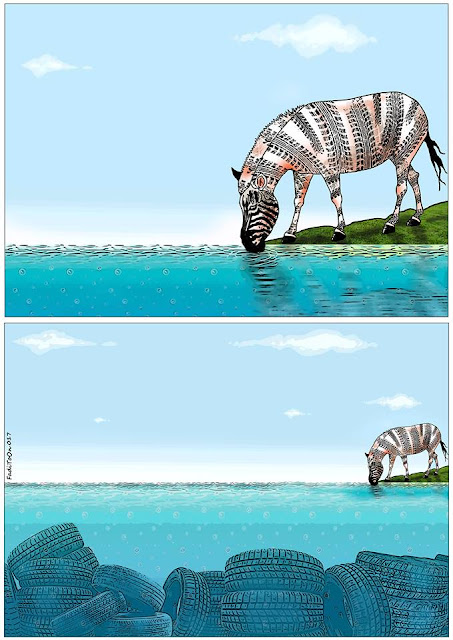Portræt af en salafist - set fra Tunesien
PORTRAIT OF A SALAFIST - AS SEEN FROM TUNISIA
ENGLISH TRANSLATION IN ITALICS
 |
WillisfromTunis ved Nadia Khiari kan naturligvis sin Kafka og ved derfor, at alle revolutioner siver ud for at efterlade sig et nyt bureaukrati på revolutionens losseplads.
Nadia Khiari's Willis knows of course his Kafka and is
thus fully aware that all revolutions eventually trickle out leaving behind a
new bureaucracy on the landfill of the revolution.
 |
| - Men hvilket monster har De skabt, Dr. Franckeinstunisia? - But what monster you have created, Dr. Franckeinstunisia? |
Et nyt bureaukrati, som mener at vide, hvordan der skal tales og tænkes. Willis havde et skrækindjagende møde med Docteur Franckeinstunisia, der var et produkt af salafisterne, vindere af det første frie valg i Tunesien. Deres ideal er en robot, der lader sig manipulere, netop som en ny forfatning skal forhandles. Så salafisterne selv blottes i hendes tegninger, og de kan genkendes på deres skæg:
A new bureaucracy, who believe they know the right way
to speak and think. Willis had a terrifying encounter with Docteur
Franckeinstunisia, a product of the Salafists who were the winners of the first
free elections in Tunisia. This is the embodiment of their ideal: A robot to be
manipulated at the very moment when a new constitution is to be negotiated.
Consequently she exposes the Salafists themselves in her drawings, recognizable
on their beards:
Tænksomhed kan til gengæld tvinge selv en selvbevidst kat op i et træ til musenes tilråb om, at gaden tilhører dem, og at "du er et mindre onde dér, Willis". Han har lagt Kafka bag sig for at nærstudere Pesten af Camus, om et epidemiramt samfund, hvor al kommunikation lukkes ude, indtil befolkningen er i eksil i deres eget land:
To hear Nadia Khiari talk about her drawings is to enter
directly into a political discussion in which she plays with the puns that
occur while talking. She speaks her drawings and new ideas arise throughout from
the rhythm of words and their opposites. It is a rare treat to experience a cartoonist
see and in particular hear her ideas.
Thoughtfulness can on the other hand force even a self-confident
cat up a tree to the heckling of mice that the street belongs to them and that
"You are a lesser evil up there, Willis". He has put Kafka behind him
to study "The Plague" by Camus, on a community struck by an epidemic
in which all communication is shut out to a degree that the population is in
exile in its own country:
 |
Typisk for antidemokrater, nu som før, er deres råberi og især råberi over, hvad andre må foretage sig. Forsøg på dialog forbliver ensidige, for der finder ikke en udveksling sted. Der dekreteres. Forhåbentlig er Nadia Khiari netop nu i Frankrig til tegnerfestival. Men Willis' udbrud nedenfor kunne tyde på, at forberedelserne ikke har været enkle - netop nu, hvor en salafist vil sætte lighedstegn mellem hele Frankrig og et ugemagasin - og hun er jo tegner?
A peculiarity of the anti-democrats, now as before, is
their shouting and yelling and in particular so about what others should do. Any
attempt at a dialogue with them remains one-sided in that exchange is
non-existent. They decree. Hopefully is Nadia Khiari currently in France to
represent a festival on cartooning. But Willis' outburst below indicate that
the preparations have not been simple - right now when a Salafist equates
France as a whole and a weekly magazine - and she is after all a cartoonist?



